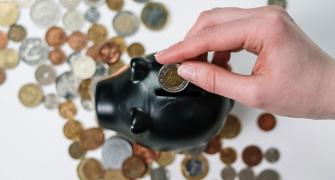Why is the dollar so weak?
Part of the reason, says Douglas Holtz-Eakin, senior policy adviser to John McCain, is Barack Obama. He's scaring off international investors.
In pictures:
Who's gaining from a weak dollar?
Where to go on the weak dollar
Oh really? The value of the dollar is in large part determined by future expectations concerning the strength of the U.S. economy and the ability of the President and Congress to balance the budget and control the trade deficit.
Actually, the dollar has depreciated only slightly against the euro, and it has appreciated against the yen, since June 4, the day after Obama clinched the Democratic nomination. On that day, one dollar bought 0.64 euros and 105.64 yen; on Monday afternoon, one dollar was worth .63 euros and 106.43 yen--though it has fluctuated against both currencies.
Still, Holtz-Eakin asks, "Would you feel good about sticking your money in the United States?"
In pictures:
Wall Street's 20 top earners
How to travel well on a weak dollar
Speaking Monday to Forbes.com, Holtz-Eakin said Obama should "stop threatening to shut down trade, stop threatening higher taxes on unpatriotic companies, stop threatening the privacy of the ballot box for unionisation. ...These things are all things that if you try to evaluate the climate for your investment, do those look appealing?"
Obama campaign officials weren't immediately available to comment, but they have a standing invitation to meet with Forbes magazine and Forbes.com to discuss their policies. (Forbes Editor-in-Chief Steve Forbes has advised the McCain campaign on economic policy.)
Holtz-Eakin concedes his remarks probably fall "under the official line of ruthless partisan attack." Obama has stated an intent to renegotiate labour and environmental standards within the North American Free Trade Agreement, but has not proposed shutting the agreement down. The June announcement of his top economic aide, Jason Furman, drew fire from labour unions for being too supportive of free trade.
In pictures:
World's most economically powerful cities
The jab about unpatriotic companies refers to the Patriot Employer Act, a piece of Senate legislation proposed last year that would provide tax credits to companies that paid higher wages, supplied a certain level of health care coverage and matched at least 5 per cent on a retirement plan, plus a number of other conditions.
"I would hope that people would recognise that John McCain is interested in the long-run fundamentals of the strength of the dollar, and that includes international investors," Holtz-Eakin says.
In a comment that should come as no surprise to anyone, Holtz-Eakin told Forbes that the best thing McCain can do to buoy the dollar is to "be president." He says McCain's nonpartisan "style of doing business" and particularly his stance on energy issues will help shore up strength in the U.S. economy.
McCain has in fact made waves in recent weeks with his energy proposals, but mainly for the controversy they've created. Earlier this summer, he proposed a gas tax holiday from Memorial Day to Labor Day, which many economists derided for encouraging gasoline consumption.
He's proposed opening up the Outer Continental Shelf for oil and natural gas drilling, much to the dismay of environmental groups. He's also proposed adding 45 nuclear plants by 2030 without a firm solution for where to store the waste. Both McCain and Obama support a market-based mechanism to curb greenhouse gas emissions.
And what about simply urging the Federal Reserve to raise interest rates to bring value to the dollar?
"Ronald Reagan a long time ago taught every president except the first Bush that it was not wise to assault the independence of the Fed," Holtz-Eakin says.
"Quite frankly there will be times in every president's tenure, perhaps, when there's some political discomfort with what the Fed's up to, and you simply have to recognize that it's their job to take care of the economy," he adds.








